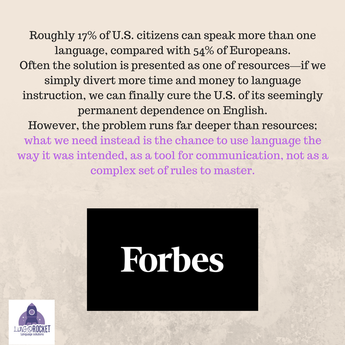LINGO ROCKET BLOG |
|
Translation is only one of several elements of localization process. More and more companies are realizing the importance of adapting graphics and content to target global markets. We are sure many of us remember slightly sloppy but handsome Trivago pitchman, Tim Williams, aka Trivago Guy. But did you know that Trivago uses different pitchmen for different markets? Scroll through the images below to find Trivago pitchmen from different global markets. Feel free to let us know which Trivago Guy is your favorite.
0 Comments
 ¿Hablas español? If not, it might be a good time to start taking Spanish lessons now. Not only is Spanish the second most frequently spoken language in the US and a very dominant language in the world; it is also pleasing to your ear to hear or say something in Spanish. Here are five very good reasons why we think you need to learn Spanish sooner rather than later.
Have we convinced you yet? Give us a call at 804-997-9308 or email at [email protected] to start your Spanish exploration today. "If I’m selling to you, I speak your language. If I’m buying, dann müssen Sie Deutsch sprechen!" Willy Brandt
The above quote was once said by Willy Brandt, a former German Chancellor, and the quote stands true to this day, especially for companies with global presence. If your company is a part of a global business network, make sure your website and marketing materials are understandable to your global clients and partners. To prove our point of how important it is to hire a professional company for your translation and localization needs, we put together a list of mistranslated marketing campaigns around the world:
 "Translation is that which transforms everything so that nothing changes." Günter Grass 1. The most common target languages for translation are German, French, Spanish, English and Japanese. 2. The Bible is considered to be the most translated text in the world. Pinocchio takes the second place when it comes to being the most translated book. 3. The most translated authors are Agatha Christie, Jules Verne, and William Shakespeare. 4. The majority of the world’s translation community (about 45%) live in United States 5. Some of the most difficult languages in the world include Arabic, Hungarian, Japanese, Finnish, Polish, and Chinese.  • Black Cat Crossing the Road Russian superstitions, depending on their purpose, can bring you good luck or failure. One of the most known and feared Russian superstitions is a black cat crossing the road. It turns out that this prejudiced attitude towards black cats comes from ancient Russia. At that time, pet owners were afraid to let black cats out of the house, as the cats were valued very much and considered family members. If spotted outside, a cat meant misfortune. But over time the number of these stray animals grew larger and larger and this prejudice became very famous. After all, black color is associated with evil spirit. • Knocking on Wood Just like in the West, when someone in Russia says something they hope will remain that way (e.g. "I’m quite healthy") they will knock on wood. However, they don’t actually say “knock on wood”. They perform the knocking action and then spit three times over their left shoulder (usually not literally spitting – just making the motion and sound). This is supposed to symbolize spitting on the Devil. Even if they don’t do the spitting part, Russians will still tend to literally knock on something – and in the absence of wood, usually their own heads. • Spilling Salt Is an Evil Omen To protect themselves from misfortunes Russians are very careful when it comes to spilling salt. It is believed that if you scatter salt then arguments with people close to you are inevitable. The rationale here is that in ancient Russia salt cost a lot of money and spilling it could lead to a fight. • Sitting Down Before a Trip Russian people have a tradition of sitting down somewhere near the door inside their home before going on a trip. Even if just one person is going away, the whole family will sit down – just for a short while, 30 seconds to a minute. This is supposed to ensure a successful trip. • Hiccups (Yes, even hiccups) If you have the hiccups, Russians say it means that somebody is thinking about you. • Stepping on Someone's Foot If a person accidentally steps on your foot in Russia, it’s quite common for the person stepped on to lightly step onto the other’s foot. This is because an unreturned step means that the two will have a fight in the future. Returning the offense prevents the fight.  An Apostille (pronounced “ah-po-steel”) is a French word meaning certification. Apostille is attached to a document so that will be accepted when used overseas. Every country has designated authorities to issue apostille certificates. In the United States, all 50 states and the Federal Government (US Department of State – Office of Authentication) can issue an Apostille. Usually apostille services are provided either by the Secretary of State or Division of Revenue and Enterprise. In urgent cases the authentication can be completed within a 24-hour period. If you want to get an important document from a foreign country or are sending an important document overseas you need to make sure it has been through the apostille process. Documents that need to be apostilled:
If you have a document that needs to be authenticated for use in a country where the Apostille Convention is not in force, the U.S. Department of State Authentications Office has useful information on its website about the process.  Whether you are a fan of Russian literature, interested in Russia’s investment opportunities, or a traveler captivated with visiting a vibrant country that offers a chance to visit extreme Far East, colorful resort towns, Red Square, and taiga; you might want to embark on an adventure of learning Russian language. We’ve invested some time into researching best resources for learning Russian so you can jump right into learning this fascinating and rewarding language. Great resources for learning and teaching Russian as a foreign language. Here you can find tons of great activities for both kids and adults, amazing book recommendations, read about raising bilingual kids, and download Russian worksheets. You can even find useful exercises that you can do before and after reading “Tom Sawyer” in Russian. Mosfilm is the largest and oldest Russian film studio. Some of the movies on their website are with English subtitles and all of them are truly amazing. Enjoy immersing yourself into the world of Russian language and culture. Great website for strengthening your Russian vocabulary, learning Russian pronunciation, mastering Russian grammar, and exploring FREE interactive lessons. Another great resource for learning any language is listening to a podcast. BBC’s “Fifth Floor” lets you get your fix of current events while mastering your Russian proficiency. You can even download podcasts and listen to them at your own convenience. If you are looking for more great resources for learning Russian that in return can help you improve your employment opportunities, learn more about Russia’s science and technology, or get immersed into Russian culture, be sure to email us at [email protected] or give us a call at 804-997-9308. If you are looking for a new language to learn, Mandarin Chinese might be a perfect adventure to embark on. Mandarin is the most spoken and fastest growing language in the world, widely used in China, Taiwan, Hong Kong and Macau. It is also the third most commonly spoken language in the United States.
Give yourself a chance to be a front-runner in global markets and unlock new business opportunities with Mandarin Chinese. With Chinese economy on an astronomical rise, Mandarin has become an essential language in the business world. China has become the world’s largest trading nation in 2013 and the largest exporter of goods in 2009. The main exporting destinations are the United States and the European Union. By 2030 China is expected to become the world’s largest economy. Chinese corporate sector has established its global importance in technology, engineering, consumer goods, and pharmaceuticals areas. Another reason to learn Chinese is exploring incredible diverse Chinese culture and the most ancient literature in the world. Understanding the basics of Mandarin Chinese will serve as an open door to comprehending Chinese social norms, customs and mentality.  Cultural awareness is a vital part of our globalized society and it encompasses the ability to see a situation from multiple cultural perspectives simultaneously. Whether you are relocating to a new country for a job assignment, participating in a study-abroad program or traveling abroad for a business meeting, been thrown into a new culture might seem like a shock to you. Any little detail from how you shake hands to what you choose to talk about during lunch can make or break your visit. Cross-cultural blunders occur when we see other cultures through our own cultural limitations. In many cases we tend to assume and add unnecessary judgment in situations that we are not familiar with. Studying cross-cultural awareness becomes even more important if you are a part of a company that has global presence. When conducting global business you have to know when it is appropriate for a lunch meeting to go over time and when you have to be aware of time constraints and wrap up a meeting right on time. The way you greet people is also vital if you want to make a good first impression. In some cultures (US is one of them) it is encouraged to be the first person who introduces themselves and says hello; on the other hand, in other cultures (e.g. Korea or Japan) it is expected to wait until a person of a higher professional rank greets you first. While it could be challenging to break out of you cultural constraints you can achieve it with cultural awareness training. Exercises that work the best are those that push you out of your comfort zone and make you see how things can be perceived in different cultural backgrounds. A great example of the exercise mentioned above is being asked to give negative feedback to people from various cultural background and learn from each other how people give and react to feedback in different cultures. You can even work on your cultural awareness from the comfort of your own home. Some great ways to do that are to learn about traditional celebrations from other countries, study about education around the world and read proverbs from different languages. Whatever you do to improve your cross-cultural awareness, remember to notice, understand and embrace cultural differences. |
|
|


 RSS Feed
RSS Feed

